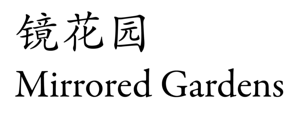The Ground
September 30–December 15, 2017
Hualong Agriculture Grand View Garden
Panyu District
Guangzhou
China
Hours: Wednesday–Sunday 11am–5pm
mail@mirroredgardens.art
The Ground is a composition which takes inspiration from the long-term observations of human practices within farming and agricultural context of the Pearl River Delta.
Like the cycles of soil that recovers from fertilizer, The Ground has no beginning and no end.
Its pulses and rhythms are the Mirrored Gardens’ traditional brick walls. Its timbers and textures are its piles of rocks and the aggregates that form these rocks.
Its sound libraries and samples are compost. Some were cut and collected over years, others are unused footage and recordings from past projects.
Its instruments are the swamps, the stones, and the wood of this place. Flutes share air the way ponds do with water, analogue pedals and electronic software filter and distribute sound the way farming spiral structures support plants.
Its space is the neighborhood’s fish ponds and their invisible connections. And like an aging tree in the bottom of a river, it is a space to invite musicians and artists to use it as a record, a bow, an orchestra. A studio, a garden or a temporary place to cultivate sound.
—Tarek Atoui
The Ground will host the following musicians at Mirrored Gardens:
October 16–23: Shane Aspegren
November 6–13: Deng Boyu
November 27–December 2: Takuro Mizuta Lippit
December 3–8: Wu Na
December 6–13: Xiao He
Shane Aspegren
Born in Nebraska, US, currently resides in Hong Kong. Working at an intersection between sound, performance and visual art forms, his projects span fields such as music, video and installation, with an approach that often juxtaposes obsessively-fixed elements with improvised or temporal aspects. After receiving a BA in Film Studies & Photography, he moved to Paris and formed the electronic music duo The Berg Sans Nipple, releasing seven albums and making hundreds of performances around the world from 2002–12.
Deng Boyu
From Inner Mongolia, he is a professional drummer, who has worked with multiple bands. His works include rock, jazz, noise and improvisation. He is at the same time a vanguard electronic Musician. Being almost obsessive about constructing minimalistic ambiences, his works are full of exquisit and whimsy compositions which shows his characteristic aesthetic of sampling and collage.
Takuro Mizuta Lippit
Aka dj sniff, Takuro is a musician and curator in the field of experimental electronic arts and improvised music. His musical work builds upon a distinct practice that combines DJing, instrument design, and free improvisation. He has performed internationally at various venues and festivals around the world, and has released 12 DJ mixes and 4 albums, which includes collaborations with Evan Parker, Otomo Yoshihide, Martin Tetreault, and Paul Hubweber. He was appointed as Artistic Director of STEIM in Amsterdam from 2007 to 2012.
Wu Na
Born in Chongqing, China, Wu Na started learning guqin at 9 under the guqin artist Mrs. Zhao Jiazhen and later Mr. Li Xiangting. She became the first postgraduate student majored in guqin performance from The Central Conservatory of Music in 2004. Wu Na is an active transdisciplinary performer, often collaborating with musicians from various fields including jazz, rock, and experimental music. She actively explores the meaning of guqin improvisation in the context of our contemporary life. Now she is a guqin teacher at the music academy of the Capital Normal University and has established Man Xue Tang, the first guqin online education platform.
Xiao He
Folk singer, music producer, founder of Music Portrait and Echo Action. The third son of Tian Qiaoyun and He Pingsuo, he has released band albums Please Enlarge a Picture of My Cousin and Footsteps Bursts. Released solo albums include: Birds That Can Fly High Don’t Land on the Backs of Oxen That Can’t Run Fast, Identity of the performance, Silly’s Ballad and Soundtrack collection 2006–2013.
Tarek Atoui
Tarek Atoui is an artist and composer, working within the realm of sound. His work often revolves around performances that develop from extensive research into music history and tradition, and explore new methods of collaboration and production. At the core of his work is an ongoing reflection on the notion of instrument and how it overlaps with the acts of composing and performing.
Atoui’s use of sound challenges and expands our established ways of understanding and experiencing this medium. His project WITHIN, for instance, departs from Deaf Culture to find new ideas for building instruments, composing and performing. On The Reverse Collection, instruments of unknown age and origin in an anthropology museum, get played and recorded then a new collection of instruments is created from exclusively listening to these recordings.


